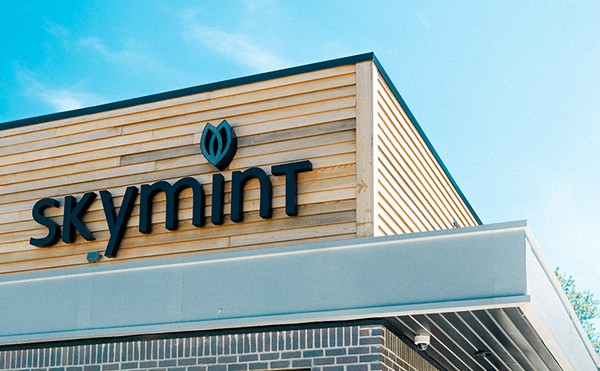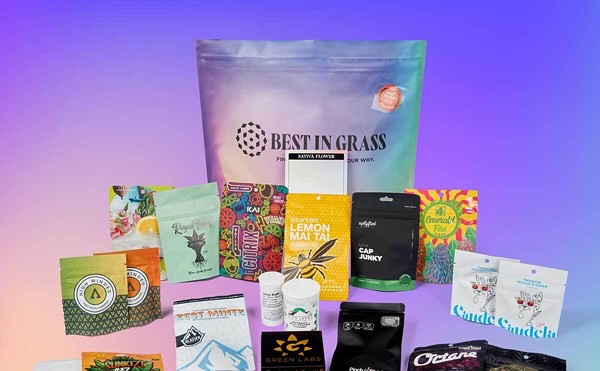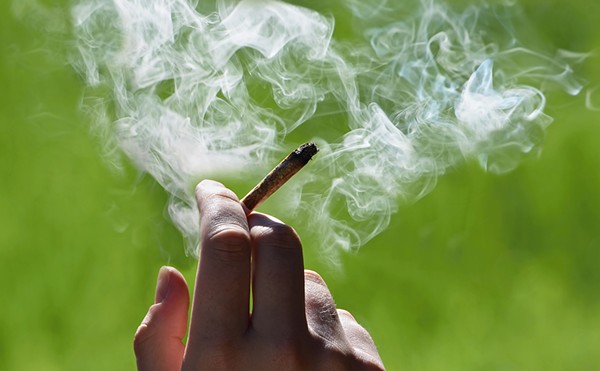Moms against the drug war
Robin Schneider remembers Christmases as a young child: sitting in a visitation cell at a federal prison in Indiana, chatting with a father she saw only two or three times a year. The visit was short. The drive with her mother and two brothers was long. Her father had been busted and imprisoned on a marijuana conspiracy charge when she was 3 years old.
"I had a really tragic childhood because my father was incarcerated on a marijuana-related charge," say Schneider. "It destroyed my childhood. It ruined my brother's life and ruined my mother's life. Taking away a parent who has committed no violent crimes, putting him in jail, is a disservice for American families, having to spend Christmases in a visitation cell instead of around a Christmas tree."
The arrest of Schneider's father came in a paramilitary raid where police busted in wearing masks with guns drawn.
"That's a vision that never leaves your head," says Schneider, 33. "Being a kid in a raid is very traumatizing. There is no night that I don't lay in bed and pray to God that I never get raided again. They found naked pictures of my mother, lined them up, made comments about her and confiscated them. I think that my dad did use marijuana, but he certainly wasn't some big time criminal. Why do they kick in the door and run in like that and point guns at kids? ...
"It affected my self-confidence; I spent years and years in therapy. One time in my life I was assaulted, and I blame that on the fact that my father was absent and my mother had to work her butt off to support us."
By drug war standards, Schneider's life might be considered collateral damage — the innocent people who get hurt when you go after the guilty party. But she's fighting back. Last month she exhibited the self-confidence to co-found Michigan Moms United to End the Drug War along with activist Charmie Gholson, a mother of three who publishes the Ann Arbor-based Midwest Cultivator, a publication supporting medical marijuana issues. But Michigan Moms is not about medical marijuana. Its focus is ending the drug war. The organization was kicked off on June 17, the 40th anniversary of the President Richard Nixon's declaration of the War on Drugs.
"It's really a group of mothers throughout the state of Michigan who, for one reason or another, have decided that the drug war is a failed war," says Schneider, a mother of four. "It's ruined hundreds of thousands of lives and destroys families. We want drugs to be treated as a public health situation rather than a criminal situation."
Gholson adds, "We hope to play the same role in ending the costly, family destroying, failed drug war as mothers played in ending the prohibition of alcohol."
The thing about women helping to end alcohol prohibition is news to me. I'd heard of the Women's Christian Temperance Union having been in support of Prohibition and against demon alcohol. But Gholson has done her homework. The repeal of Prohibition had plenty of organized female support thanks to Pauline Sabine.
Sabine, who had voted for Prohibition, changed her mind when she saw the corruption, violent crime, and underground drinking that Prohibition engendered. She founded the Women's Organization for National Prohibition Reform in 1929. By the time Prohibition was repealed in 1933 the WONPR had 1.5 million members.
"As they had at every stage of the Prohibition battle, women played an extremely important role in its final phase, the overturning of the 18th Amendment," wrote University of Dayton historian David Kyvig in a paper titled "Women Against Prohibition."
Schneider and Gholson are hoping their efforts, along with a network of women-against-drug-prohibition organizations across the state and nation, help create a similar end for drug prohibition. Their main tactic is to educate people with facts — talk to friends, write letters and editorials to newspapers, speak to local civic organizations.
For instance, Gholson found these Michigan State Police statistics on the arrest rates for reported crimes in 2008, and published them in the July Midwest Cultivator. The women are particularly incensed that the arrest rate for reported rapes, for instance, is 16.24 percent, while the arrest rate for victimless drug violations is 77.84 percent.
They use these statistics to illustrate their point that the drug war has skewed our priorities and argue that law enforcement officers should be going after violent rapists rather than nonviolent drug users. The group plans to present this kind of evidence to Rotary Clubs, churches, Chambers of Commerce and other organizations, county by county across the state.
"Those are the people who get things done in their communities," Gholson says.
These moms are about getting things done too. As much as this is about changing public policy, it's also mothers protecting their families. Mothers worry about their children and want to protect them.
"Kids by nature are going to want to do something that is forbidden," Schneider says. "I hope to God my kids never use drugs, but if they do experiment, I'm going to be there to try to help them. I don't want to go get high. I have four kids and taught Sunday school. This is about keeping families together."
My mom told me not to run with scissors in my hand. But you have to consider a lot more factors in protecting your kids these days.
While researching women's groups during Prohibition, I found out a few more interesting facts about what happened during the era. Like today's stores that sell growing equipment, back then there was a proliferation of "malt and hop" stores for baking and beverage purposes. Malt and hops are used in beer making, something you can do at home.
Medical marijuana supporters might find it interesting that, during Prohibition, whiskey could be obtained by prescription from medical doctors. The bottle had clear instructions that the contents were for medicinal use only. Doctors were known to be pretty free with their prescription writing, and folks picked up their medicine at drug stores.
After Prohibition was repealed, a number of prominent citizens and even politicians admitted to using alcohol while it was illegal. It was even revealed that President Warren Harding, although he had voted for Prohibition as a senator, had kept the White House well stocked with bootleg liquor. If marijuana were made legal today, I wonder how many prominent citizens would come out of the closet.
Another thing I realized was that during my father's formative years, it was actually legal to smoke marijuana and illegal to drink alcohol. My dad was born in 1915. Prohibition started in 1920 and lasted until 1933. Marijuana was not definitively illegal nationwide until the Marihuana Tax Act passed in 1937. Dad used to talk about his father burying whiskey in the back yard but I never really thought about why he would do that until now. Also, my father once made a big deal about being able to drink alcohol openly in front of police. I guess that is impressive when you can remember a day when you couldn't do that.






